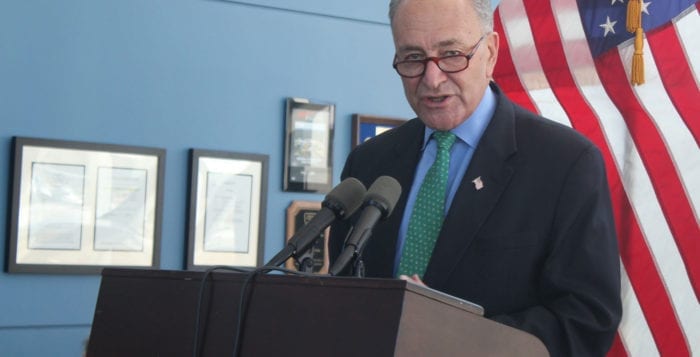A federal program meant to help keep businesses afloat during the pandemic has caused more headaches than relief. Business owners are concerned they will be saddled with more debt and unclear guidelines have left them with more questions than answers.
James Luciano, the owner of the Port Jeff Lobster House and the Port Jefferson BID secretary, has received PPP loan funds, but expressed concern of how the federal government will handle the forgiveness process.
“It [the PPP restrictions] has been so loosely written, it’s like reading a different language,” he said. “They have also changed the applications for loans two or three times.”
“There are some things that the current guidance doesn’t answer.”
— Bernie Ryba
Luciano has begun to use the money for rent, other remaining bills, paying vendors and some payroll expenses. Though until he and other business owners receive the approval to fully reopen its businesses, he said he may struggle to comply with the forgiveness guidelines.
For the loan to be forgiven, 75 percent of funds must be used for payroll, keeping staff to pre-pandemic levels for eight weeks after the money is disbursed.
“The clock starts ticking once the money hits your account,” Luciano said.
The Port Jeff Lobster House owner reiterated the difficulty of bringing all employees back without the doors being open. Another obstacle is that some employees may opt to continue on unemployment as they are receiving considerably more money than at the restaurant, according to Luciano.
Bernie Ryba, director of the Stony Brook Small Business Development Center, said there has been a lack of clarity on the forgiveness guidelines.
“Clients have expressed some concerns to us, we are looking to the [federal Small Business Administration] for guidance on the forgiveness provisions,” he said. “It has caused many questions from us, CPA firms and law firms. We are hoping this is cleared up as soon as possible.”
Ryba said the center advises hundreds of clients and has received dozens of calls and emails from business owners on this topic.
“As a business center we try to do research and address their questions the best we can, but right now there is very little to refer to,” he said. “There are some things that the current guidance doesn’t answer.”
Ryba pointed to one of the provisions of PPP that requires 25 percent of funds must be used on utilities.
“Can it be used for heat, power, internet and transportation expenses? No one knows because there are no specifics,” he said. “There are lenders who have already spent some of their funds.”
The director of the business center said that the federal government didn’t have much time to react and the SBA was not staffed to handle the influx of applications from the onset.
A recent report from SBA Inspector General Hannibal Wared detailed that many small businesses could struggle to meet the 75 percent payroll requirement.
Ware called on the association to evaluate the potential negative impact to borrowers regarding the percentage of loan proceeds eligible for forgiveness and update requirements.
With uncertainty over the current criteria of PPP, local municipalities have stepped in to offer alternatives to businesses.
Brookhaven Town is offering $10,000 grants to small businesses as part of its Emergency Microenterprise Business Relief Program. It is aimed at microenterprise businesses within the town that have five employees or less. The town received a special allocation of funds provided by the U.S. Department of Housing and Urban Development under the CARES Act.
The new norm for businesses could include being six feet apart and the use of protective dividers. Sean Hanley of LB Fabrication & Automation LLC., has begun making plexiglass social distancing dividers in an attempt to help his own business survive and also to allow any business to open up to full capacity. He has already installed dividers at Salon Blonde in Port Jeff, which is run by his wife.
Many who first applied for the PPP loans after the initial April launch did not receive funds before the first set of $349 billion ran out by April 16.
Hanley’s Smithtown-based business was shut down following Governor Cuomo’s executive order. A good portion of its business comes from work on construction and other job sites where its metal fabricator and masonry services are sought after.
“The clock starts ticking once the money hits your account.”
— James Luciano
He and his wife both missed out on the first round of the PPP loan applications but were able to get through in the second batch of applications.
“We’re still waiting to hear back, but we would look at paying the rent first,” he said.
Hanley is hoping the state will begin to relax restrictions so he and his wife can reopen their businesses and bring back their respective employees.
While owners are anxious to reopen, there has yet to be any indication in what capacity businesses will be able operate. Social distancing guidelines will also play a factor.
Luciano said it would not help his restaurant at all if he is potentially forced to reopen with significantly fewer customers.
“We’re used to filling the place up, it would be hard for us with less capacity,” he said.
In addition, Luciano expressed concerns on how social distancing could affect the day to day operation of the restaurant and impact the customer experience.
“I think right now it is better to do the takeout services, we have been taking full advantage of the village’s delivery program,” he said.
He said this is time when many businesses reap the benefits of increased foot traffic in the village and use funds to pay bills from the offseason in the winter.
“We start to break even during May and in the summer is where we make a lot of our money, Luciano said.
Close to two months into the pandemic, Ryba said they are still “early in the game}” and even as the crisis ultimately ends it could have wide-ranging effects.
“There are a lot of difficult things that need to be sorted out, you could have millions of individuals who will be without a job,” the director of the business center said.







